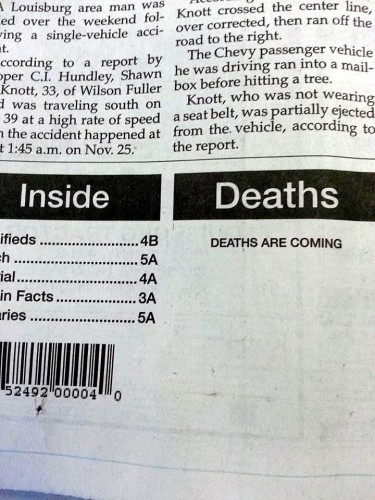I vividly remember the first day my medical school classmates and I met our cadavers in the anatomy lab. Large body bags lay on metal tables that had been bolted to the floor. I remember the sheer size of the bags best. No doubt existed in my mind that dead human bodies indeed lay within them. And yet part of me couldn’t quite grasp that I was actually going to soon be unzipping them and cutting into flesh through which blood had once flowed as freely as it now did in mine.
Thus recalls Dr Alex Lickerman. He goes on:
I vividly remember also a classmate of mine—one who’d struck me as being particularly sensitive to others—leaning against the wall at one point, looking pale and shaky. I remember worrying that she was going to faint.
But she didn’t. And like the rest of us, soon she was cutting into her cadaver with focused precision. Within only one week we all had habituated to the notion that we were dissecting dead people as if they were only mannequins.
My classmate eventually went on to become my colleague, one with whom I’ve since shared many patients. And though technically she was always excellent, again and again it would get back to me from patients to whom I’d send her that she had a poor bedside manner. And whenever I’d hear this, I’d wonder: had she always been only peripherally interested in the suffering of others (as more than one of my patients judged her to be) or did she begin as empathetic and compassionate as I’d first judged her and simply have those characteristics pounded out of her by her training and subsequent years in practice?
As I read that, I wondered about the people we saw on that ITV programme about Gillman’s. Dr Lickerman continues:
Perhaps the most insidious force that gnaws away at our ability to feel compassion is habituation. We have an amazing ability to get used to things—meaning that if repeated again and again something which at first stimulates great emotion (positive or negative) progressively stimulates that emotion less and less. This is why, I think, over time my colleague’s bedside manner deteriorated: she simply got so used to the suffering she saw day in and day out that it ceased to trigger her compassion.
It all makes pretty good sense, doesn’t it? If we’re honest, we can see how people working in mortuaries could, first, lose their sense of dead people as people and then graduate to hating them.
It put me in mind of a case which a number of people have drawn to my attention but which I did not write about because it seemed to me sad and, because unrepresentative, not all that informative. I may have been wrong. The case involved a funeral service operative (FSO) Grahame Lawler, who stole a purse from a dead woman he’d gone to collect. You can gauge why he did it when you consider what he said when he was arrested: “‘For six-and-a-half years I have been in this job and have seen some very vile nasty and horrible things. Decomposed bodies, people that have been run over, things like that. I saw the purse, I did take it and I thought it was the way out. I have never done anything like this before and I’m sorry.”
It also put me in mind of the funeral director I chatted to last week. The ethos of his business is mortuary-centred. “It all starts there and works its way thorough to everything else. Get it right in the mortuary and everyone else knows exactly what standard is expected and exactly how to conduct themselves to everyone else. It pervades the funeral home.”
Read the full Lickerman article here.


